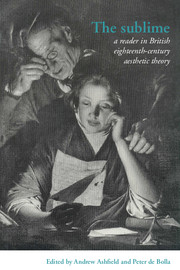Book contents
- Frontmatter
- Contents
- List of Abbreviations
- Introduction
- Part I The Longinian tradition
- Part II Rhapsody to rhetoric
- 11 The spectator, (1712-1714)
- 12 A discourse on ancient and modern learning (1734)
- 13 Characteristicks (1714)
- 14 The works (1724)
- 15 To David Fordyce, 18th June 1742
- 16 The pleasures of imagination (1744)
- 17 An essay on the sublime (1747)
- 18 Observations on man (1749)
- 19 Lectures on the sacred poetry of the Hebrews (1753/1787)
- 20 A dictionary of the English language (1755)
- 21 Conjectures on original composition (1759)
- 22 The art of speaking (1761)
- 23 A course of lectures on oratory and criticism (1777)
- 24 An enquiry concerning the principles of taste (1785)
- Part III Irish Perspectives
- Part IV The Aberdonian Enlightenment
- Part V Edinburgh and Glasgow
- Part VI From the Picturesque to the Political
- Sources and further reading
23 - A course of lectures on oratory and criticism (1777)
Published online by Cambridge University Press: 05 June 2012
- Frontmatter
- Contents
- List of Abbreviations
- Introduction
- Part I The Longinian tradition
- Part II Rhapsody to rhetoric
- 11 The spectator, (1712-1714)
- 12 A discourse on ancient and modern learning (1734)
- 13 Characteristicks (1714)
- 14 The works (1724)
- 15 To David Fordyce, 18th June 1742
- 16 The pleasures of imagination (1744)
- 17 An essay on the sublime (1747)
- 18 Observations on man (1749)
- 19 Lectures on the sacred poetry of the Hebrews (1753/1787)
- 20 A dictionary of the English language (1755)
- 21 Conjectures on original composition (1759)
- 22 The art of speaking (1761)
- 23 A course of lectures on oratory and criticism (1777)
- 24 An enquiry concerning the principles of taste (1785)
- Part III Irish Perspectives
- Part IV The Aberdonian Enlightenment
- Part V Edinburgh and Glasgow
- Part VI From the Picturesque to the Political
- Sources and further reading
Summary
Lecture XX. Of the sublime
Great objects please us for the same reason that new objects do, viz. by the exercise they give to our faculties. The mind, as was observed before, conforming and adapting itself to the objects to which its attention is engaged, must, as it were, enlarge itself, to conceive a great object. This requires a considerable effort of the imagination, which is also attended with a pleasing, though perhaps not a distinct and explicit consciousness of the strength and extent of our own powers.
As the ideas of great and little are confessedly relative, and have no existence but what they derive from a comparison with other ideas; hence, in all sublime conceptions, there is a kind of secret retrospect to preceding ideas and states of mind. The sublime, therefore, of all the species of excellence in composition, requires the most to be intermixed with ideas of an intermediate nature; as these contribute not a little, by their contrast, to raise and aggrandise ideas which are of a rank superior to themselves. Whenever any object, how great soever, becomes familiar to the mind, and its relations to other objects is no longer attended to, the sublime vanishes. Milton's battle of the angels, after the prelude to the engagement, would have been read with no greater emotions than are excited by the history of a common battle, had not the poet perpetually reinforced his sublime, as it were, by introducing frequent comparisons of those superior beings, and their actions, with human combatants and human efforts. …
- Type
- Chapter
- Information
- The SublimeA Reader in British Eighteenth-Century Aesthetic Theory, pp. 119 - 123Publisher: Cambridge University PressPrint publication year: 1996



